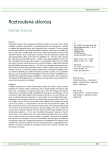Smith-Magenis syndrome: a case report
Authors:
I. Příhodová 1; D. Kemlink 1; K. Veselá 2; R. Mihalová 2; S. Nevšímalová 1
Authors‘ workplace:
Neurologická klinika 1. LF UK a VFN v Praze
1; Ústav biologie a lékařské genetiky 1. LF UK a VFN v Praze
2
Published in:
Cesk Slov Neurol N 2008; 71/104(2): 223-227
Category:
Case Report
Overview
Smith-Magenis syndrome is a rare disease caused by haploinsufficiency of the RAI 1 (retinoic acid-induced) gene associated with the deletion of chromosome 17p11.2 and/or its mutation. The clinical picture comprises mental retardation, behavioural disorders with marked proneness to self-injurious outbursts, and disordered sleep. Sleep disorders characterised by the overall sleep time shortening, premature awakening and increased daytime sleepiness are very typical features for the syndrome. The cause lies in inverted circadian secretion of melatonin culminating in daytime hours. Patients display characteristic craniofacial dysmorphia, and often multisystem involvement. A case of a female patient is presented, with a typical clinical picture, sleep aberrations and genetic symptoms.
Key words:
Smith-Magenis syndrome – circadian rhythm disorder – melatonin
Sources
1. Smith AC, McGavran L, Robinson J, Waldstein G, Macfarlane J, Zonona J et al. Interstitial deletion of (17)(p11.2p11.2) in nine patients. Am J Med Genet 1986; 24 : 393–414.
2. Greenberg F, Guzzetta V, Montes de Oca-Luna R, Magenis RE, Smith AC, Richter SF et al. Molecular analysis of the Smith-Magenis syndrome: a possible contiguous-gene syndrome associated with del(17)(p11.2). Am J Hum Genet 1991; 49 : 1207–1218.
3. Juyal RC, Figuera LE, Hauge X, Elsea SH, Lupski JR, Greenberg F et al. Molecular analysis of 17p11.2 deletion in 62 Smith-Magenis syndrome patients. Am J Hum Genet 1996; 58 : 998–1007.
4. Slager RE, Newton TL, Vlangos CN, Finucane B, Elsea SH. Mutation in RAI 1 associated with Smith-Magenis syndrome. Nat Genet 2003; 33 : 466–468.
5. Gropman AL, Duncan WC, Smith AC. Neurologic and developmental features of the Smith-Magenis syndrome (del 17p11.2). Pediatr Neurol 2006; 34 : 337–350.
6. Greenberg F, Lewis RA, Potocki L, Glaze D, Parke J, Killian J et al. Multi-disciplinary clinical study of Smith-Magenis syndrome (deletion 17p11.2). Am J Med Genet 1996; 62 : 247–254.
7. Smith AC, Dykens E, Greenberg F. Behavioral phenotype of Smith-Magenis syndrome (del 17p11.2). Am J Med Genet 1998; 81 : 179–185.
8. Smith ACM, Dykens E, Greenberg F. Sleep disturbance in Smith-Magenis syndrome (del 17p11.2). Am J Med Genet 1998; 81 : 186–191.
9. Potocki L, Glaze D, Tan DX, Park SS, Kashork CD, Shaffer LG et al. Circadian rhythm abnormalities of melatonin in Smith-Magenis syndrome. J Med Genet 2000; 37 : 428–433.
10. De Leersnyder H, de Blois MC, Claustrat B, Romana S, Albrecht U, Von Kleist-Retzow JC et al. Inversion of the circadian rhythm of melatonin in the Smith-Magenis syndrome. J Pediatr 2001; 139 : 111–116.
11. De Leersnyder H, de Blois MC, Vekemans M, Sidi D, Villain E, Kindermans C et al. Beta1-adrenergic antagonists improve sleep and behavioural disturbances in a circadian disorder Smith-Magenis syndrome. J Med Genet 2001; 38 : 586–590.
12. De Leersnyder H, Bresson JL, de Blois MC, Souberbielle JC, Mogenet A, Delhotal-Landes B et al. Beta 1-adrenergic antagonists and melatonin reset the clock and restore sleep in a circadian disorder, Smith-Magenis syndrome. J Med Genet 2003; 40 : 74–78.
Labels
Paediatric neurology Neurosurgery NeurologyArticle was published in
Czech and Slovak Neurology and Neurosurgery

2008 Issue 2
- Advances in the Treatment of Myasthenia Gravis on the Horizon
- Memantine in Dementia Therapy – Current Findings and Possible Future Applications
- Memantine Eases Daily Life for Patients and Caregivers
-
All articles in this issue
- Multiple sclerosis
- Failure of pharmacological antiepileptic treatment
- Pathophysiology of conduction block in neuromuscular diseases
- Woman and ictus
- Diagnosis of hyponatraemia in neurointensive care: the role of renal function parameters
- The Pitfalls of Diagnosis and Treatment of Flexion Distraction Injuries of the Thoracic and Lumbar Spine: a Prospective Study
- Effect of endoscopic and classic surgery for carpal tunnel syndrom
- Mild controlled hypothermia – a neuroprotective method for late ischaemic complications in resuscitation care for patients with severe spontaneous subarachnoid hemorrhage caused by aneurism rupture
- Intracranial angioplasty and stent implantation in atherosclerotic lesions
- Familial aggregation of Parkinson’s disease: a genealogical study
- PCR Detection of Herpes Viruses in Patients with Acute „Idiopathic“ Facial Paresis
- Treatment Results of Low-Grade Gliomas in Children (a Retrospective Data Analysis)
- Hemangioblastoma and its treatment using Leksell Gamma Knife
- Smith-Magenis syndrome: a case report
- Czech and Slovak Neurology and Neurosurgery
- Journal archive
- Current issue
- About the journal
Most read in this issue
- Multiple sclerosis
- Hemangioblastoma and its treatment using Leksell Gamma Knife
- Smith-Magenis syndrome: a case report
- Treatment Results of Low-Grade Gliomas in Children (a Retrospective Data Analysis)
